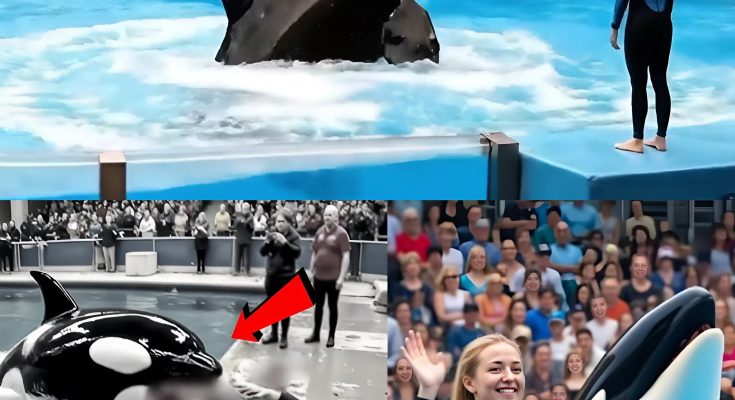After Radcliffe, another orca dies – another tragedy behind the walls of SeaWorld. The news broke quietly, almost slipping beneath the waves of public attention, but those who have followed the story of captive orcas felt the weight of it instantly. The marine park issued a short, polished statement, speaking of “natural causes” and “loving care.” Yet behind the sterile words, there lies a world hidden from the smiling brochures and colorful shows. In this imagined account, the truth is not a press release but a whispered story carried on the salt air, telling of a creature who once knew the boundless ocean before it was traded for a tank.
Her name was Kiora, a female orca in her early twenties, a creature whose dorsal fin curved like a question mark, as if it had always been asking why. Born in the cold waters of the North Pacific, she spent her early years learning the intricate language of her pod, a web of whistles and clicks that held centuries of memory. She knew the deep, resonant calls of her mother, the playful nudges of her siblings, the silver flash of herring in moonlight. But those memories dimmed the day the world above erupted in the roar of engines and the splash of nets. That was the day Kiora’s life was divided into before and after.

The park where she spent her final years was a carefully curated illusion. To visitors, it was a place of joy, education, and awe, where children pressed their hands to the glass to watch her glide by. Trainers spoke of conservation and research, speaking over the thumping music of the shows. Yet behind the scenes, the water was still and unnervingly small, the echoes of her calls bouncing back at her like unanswered questions. She swam in circles, each turn a quiet surrender to a space too small to contain her soul.
Radcliffe’s passing had been a shock to the public just months before. He was a bull orca, larger and older, his death announced with the same polished language, the same promise that nothing could have been done. For Kiora, it had been another invisible loss, one more absence in a life of absences. She had learned to live with the silence where the voices of her kind should have been. Orcas in the wild travel in tight-knit pods that remain together for life, but captivity rearranged that truth into a hollow parody. Companions were traded, separated, or gone, and the constant reshuffling left her adrift.
In her final days, there were signs that something was wrong. She floated listlessly at the surface for long hours, her breaths slow and uneven. Staff spoke in low tones, making notes on clipboards, adjusting feeding schedules. Visitors noticed she no longer performed with the same energy, her breaches low, her tail slaps half-hearted. The official story would later mention a sudden illness, but in this imagined telling, the truth is slower and sadder: it was not a single blow, but a thousand small ones, each taken over years, that wore her down.

Night at the park was when her world was quietest. The spotlights were turned off, the music silenced, and the pools lay in shadows. Sometimes, she would hover near the glass, watching the shapes of moonlight ripple across the water. In these hours, the memories returned—the cold bite of open sea, the taste of fresh salmon, the intricate calls of her family weaving through the depths. Memory was both a comfort and a wound, a reminder of what once was and what could never be again.
When the end came, it was without drama. One morning, the keepers found her lying motionless at the bottom of the tank. The water around her seemed unnaturally still, as if even it understood the weight of her passing. The statement from the park was released within hours: heartfelt words, promises of care, reminders of her role in “educating millions.” There was no mention of the endless circles she swam, the companions she lost, or the songs she could no longer sing.
Beyond the gates of the park, the news reached a scattered network of advocates, researchers, and former trainers. They spoke of her as if they had known her personally, piecing together her story from records, photographs, and the accounts of those who had glimpsed her life behind the scenes. For them, Kiora’s death was not just another statistic—it was a reminder of an ongoing tragedy hidden in plain sight.
The ocean remains, vast and unknowable, holding the living voices of wild orcas still free to travel hundreds of miles, still bound by the ties of their pods. In contrast, the tanks of captivity stand as monuments to a different kind of story—one where the sea is replaced by concrete walls, and freedom is measured in meters. Each death within those walls is a chapter in that story, one that repeats itself with unsettling familiarity.

In this imagined retelling, Kiora’s passing is not just a loss but a call to look beyond the performance, beyond the glossy images and cheerful narrations. It asks the uncomfortable question: at what cost do we claim the right to witness such beauty up close? The answer, perhaps, lies in the silence left behind when an orca’s voice is gone. It is in the stillness of the water after the last ripple fades, in the absence that lingers long after the audience has gone home.
After Radcliffe, another orca dies, and the world spins on. But somewhere, in the boundless expanse of the real ocean, a pod moves together through the deep, their voices carrying across miles. They do not know Kiora’s name, but they know her absence, felt in the shared story of their kind—a story older than any park, and far too vast to be contained.



